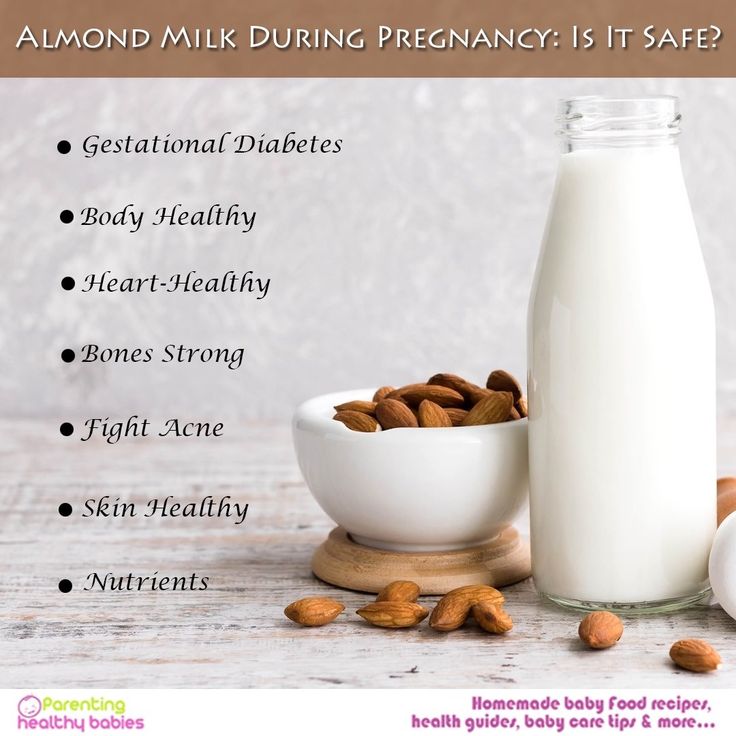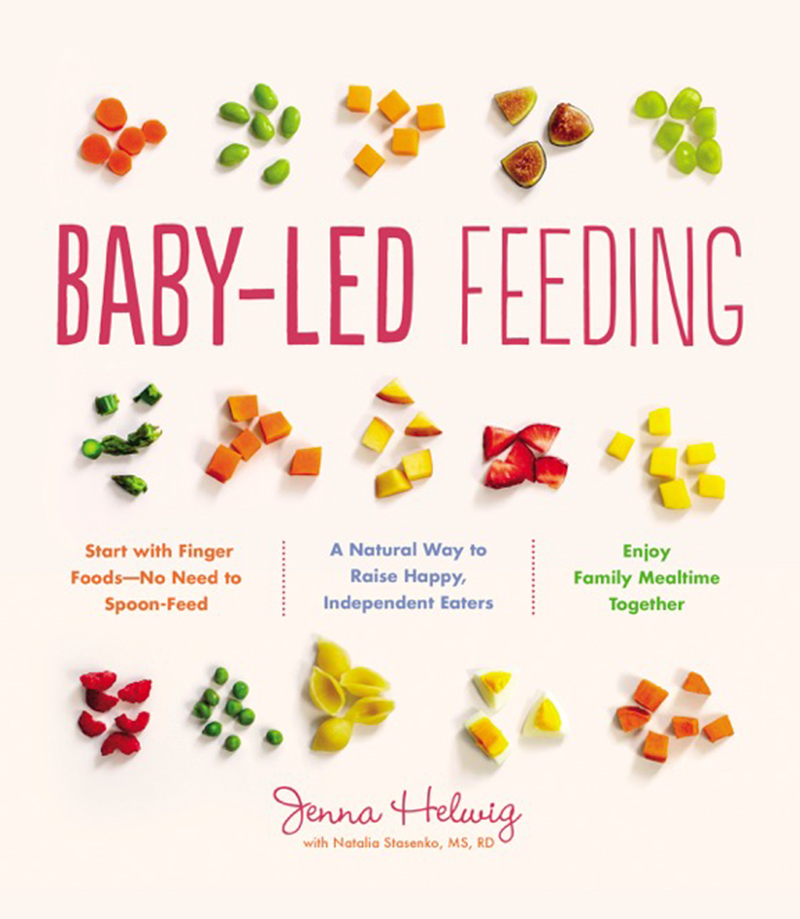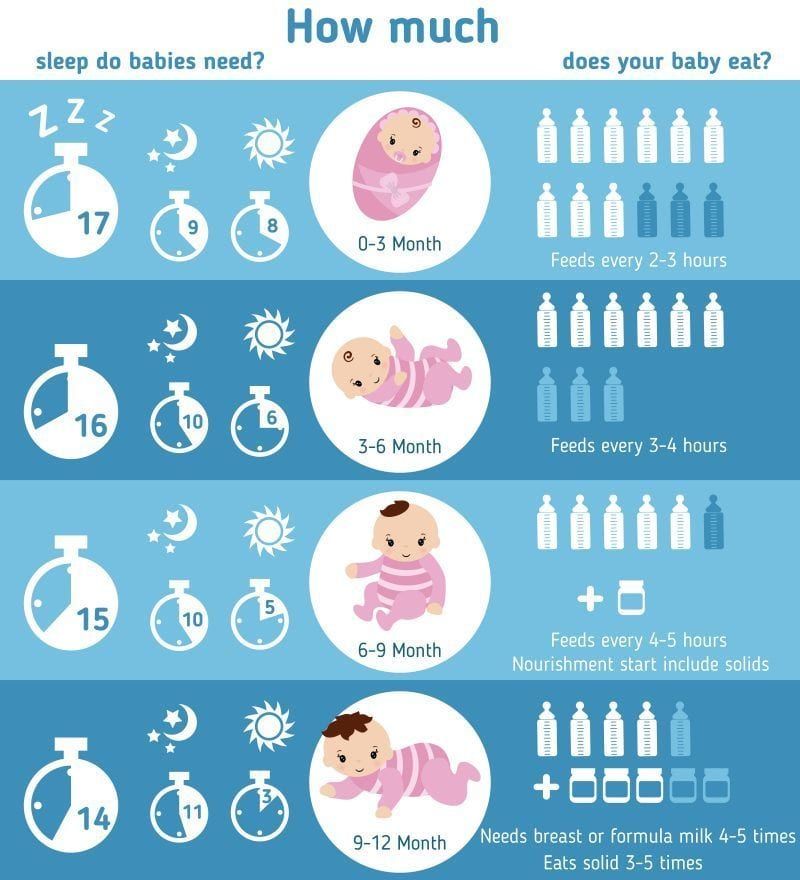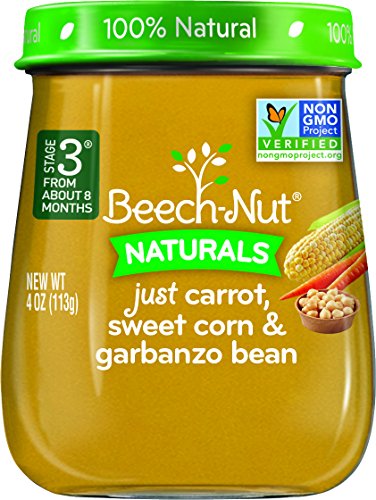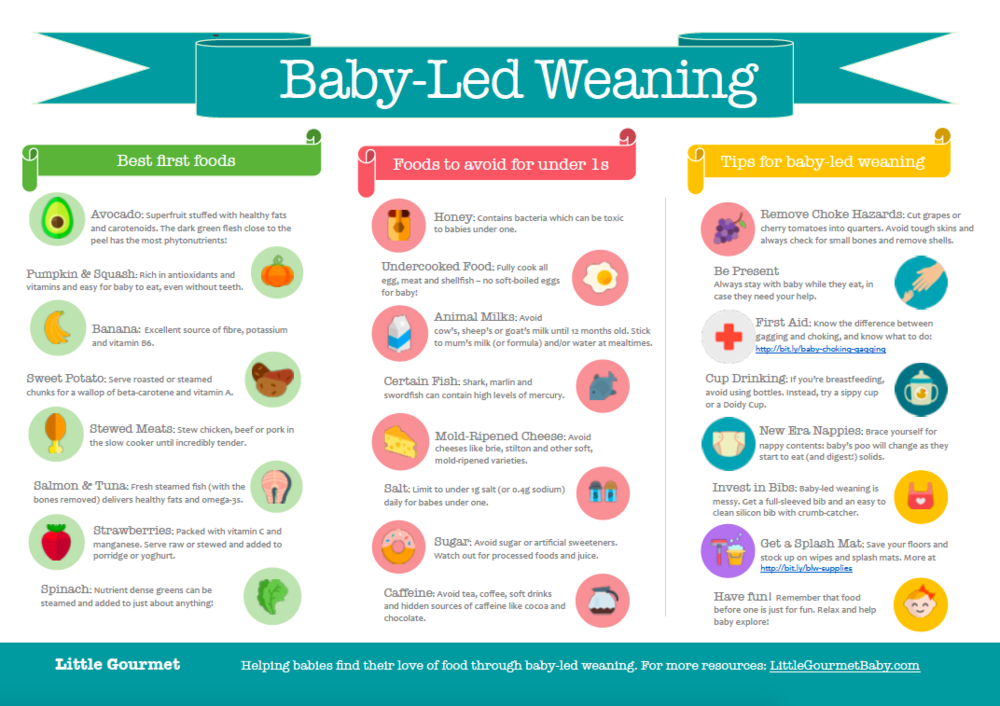Feeding baby almond milk
Almond milk for babies: Is it safe?
Almond milk is a common alternative to cow’s milk for adults, but developing babies have different nutritional needs.
Most doctors and the American Academy of Pediatrics recommend that babies less than 1-year-old drink breast milk or, if breast milk is not available, dairy- or soy-based infant formula unless otherwise advised.
Experts advise only introducing other milk, such as cow’s milk or almond milk, after a baby’s first birthday, as the specific nutrient profile in breast and formula milk is essential for development.
Almond milk can safely be given to most toddlers but is not a replacement for breast milk or infant formula.
Almond milk may be a healthful replacement for cow’s milk in some cases, but there are some nutritional differences to be aware of when making the switch.
Some people may give almond milk to children who are lactose-intolerant or if they avoid dairy for other reasons.
Toddlers can drink almond milk once or twice a day in between periods of breast-feeding or eating their other foods, but only when they are over 12 months old.
Almond milk is made of finely ground almonds and water. Other ingredients may include thickeners, sweeteners, and flavorings, such as vanilla. Many manufacturers also add nutrients, including vitamin A, vitamin D, and calcium.
Almond milk may be a safe supplement to a toddler’s diet, but no milk will compare to the nutrients provided by breast milk or infant formula.
Almond milk should not be used to replace breast milk or formula, as developing babies need specific vitamins and nutrients that these kinds of milk provide.
If anyone has any concerns that a child may be lactose-intolerant, talk to the child’s doctor. Lactose intolerance is more common in older children and adults than in babies and toddlers.
If using almond milk to supplement a toddler’s diet, ensure that:
- the milk is low in sugar or unsweetened
- the milk is fortified with calcium and vitamins A and D
- the baby consumes other forms of fat and protein
Ask a pediatrician about added ingredients, such as flavorings or thickeners.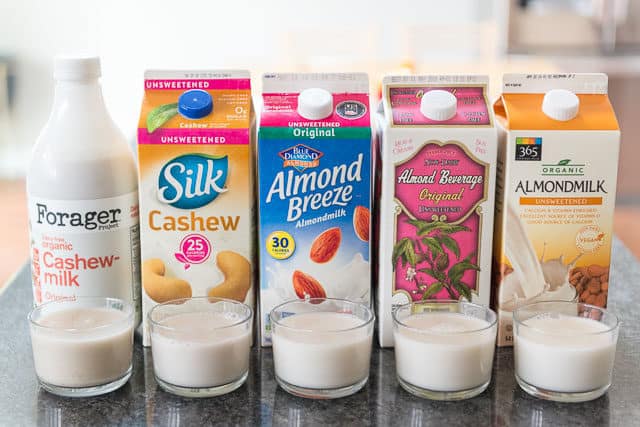
It is also essential to find out whether the baby has a nut allergy. If relatives of the baby have nut allergies, it is best to avoid nuts altogether and ask a pediatrician before introducing any type of nut milk into the baby’s diet.
Share on PinterestDifferent types of milk vary in their nutritional content.
Nutritionally, cow’s milk and almond milk vary significantly. Some doctors recommend using whole cow’s milk for weaning babies from 1 to 2 years old because it has a high concentration of fat.
A single cup of whole milk contains about 8 grams (g) of fat, which the developing baby’s brain needs to grow. In comparison, unsweetened almond milk contains only 2.5 g of fat.
According to the same report, cow’s milk is also higher in protein than almond milk: 1 cup of whole milk contains almost 8 grams of protein, but 1 cup of fortified almond milk contains only 1 gram of protein.
However, if these fats and proteins are supplemented somewhere else in the baby’s diet, almond milk may be an appropriate substitute for whole milk in toddlers.
Cow’s milk is also higher in naturally-occurring sugars when compared to unsweetened almond milk. People should be cautious and look for unsweetened almond milk, as sweetened or flavored brands may contain more sugar than cow’s milk.
The other consideration is the differences in nutrients and vital minerals between the two types of milk. A cup of cow’s milk fortified with vitamins contains:
- 276 milligrams (mg) calcium
- 322 mg potassium
- 205 mg phosphorus
- 105 mg sodium
- 395 units (IU) vitamin A
- 124 IU vitamin D
The same amount of unsweetened almond milk may contain:
- 482 mg calcium
- 176 mg potassium
- 24 mg phosphorus
- 189 mg sodium
- 499 IU vitamin A
- 101 IU vitamin D
After a baby is 1 year old, milk of any kind should only supplement their diet, and it should not take the place of other whole foods.
Neither almond milk nor regular cow’s milk are good substitutes for breast or formula milk for babies under 1 year.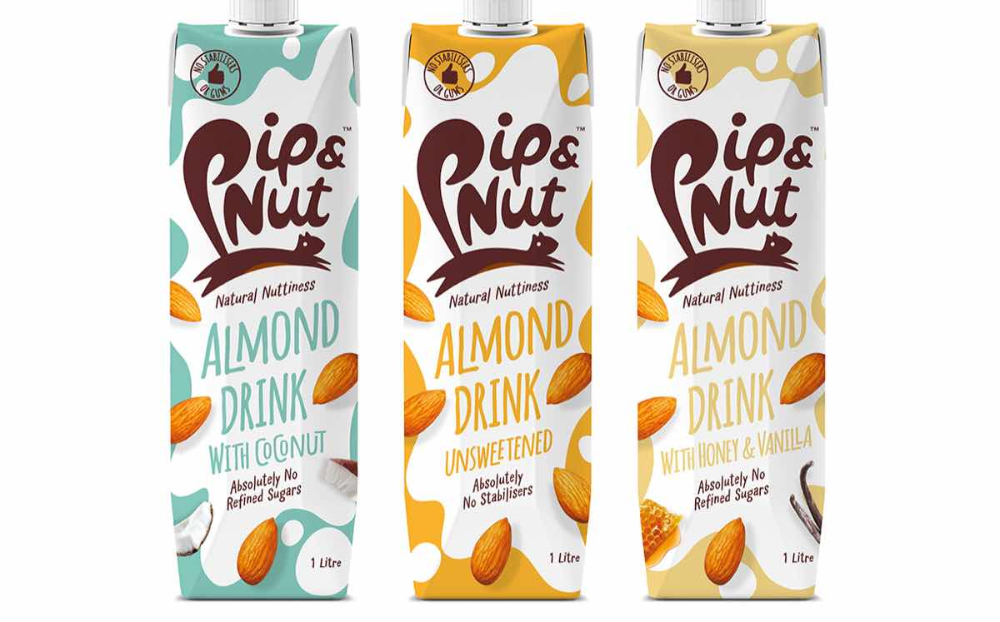 At any age, if the child is breast-feeding, no other milk is necessary.
At any age, if the child is breast-feeding, no other milk is necessary.
Just as some babies may be allergic to nuts or almonds, some babies may also be allergic or intolerant to cow’s milk. If any members of the baby’s close family are lactose-intolerant, talk to the child’s doctor about what to give them to drink.
If almond milk does not sound like the right option, people who are looking for dairy-free alternatives to give their growing toddler may prefer other plant-based milk, such as:
- coconut milk
- rice milk
- hemp milk
- soy milk
- oat milk
- hazelnut milk
Before buying plant-based milk, always check to make sure they are fortified with vitamins and minerals and are low in sugar.
Share on Pinterest1-year olds should not fill up on liquids too often.
Almond milk fortified with vitamins and minerals can be a safe supplement to a toddler’s diet. However, added ingredients such as thickeners and sweeteners are not ideal for a child.
Almond milk is low in both fat and protein content, and a toddler who is drinking almond milk will need to consume plenty of fat and protein in their diet from other sources.
Babies may have an allergic reaction to nut milks, so always talk to a doctor before adding almond milk to the diet.
Once they are 1 year old, babies should have no more than 16 to 24 ounces of any milk (other than breast milk) per day. It is essential that toddlers over 1 year old get most of their nutrition from foods and do not to fill up on liquids that do not give them balanced nutrition.
Adding one or two servings a day of fortified almond milk to a well-rounded diet is a safe alternative to cow’s milk in developing early toddlers.
Do not give cow’s milk, almond milk, or types of milk to toddlers until their first birthday. Babies younger than this should only have breast milk or infant formula.
Almond Milk for Babies: Can They Drink It?
Almond Milk for Babies: Can They Drink It?Medically reviewed by Karen Gill, M.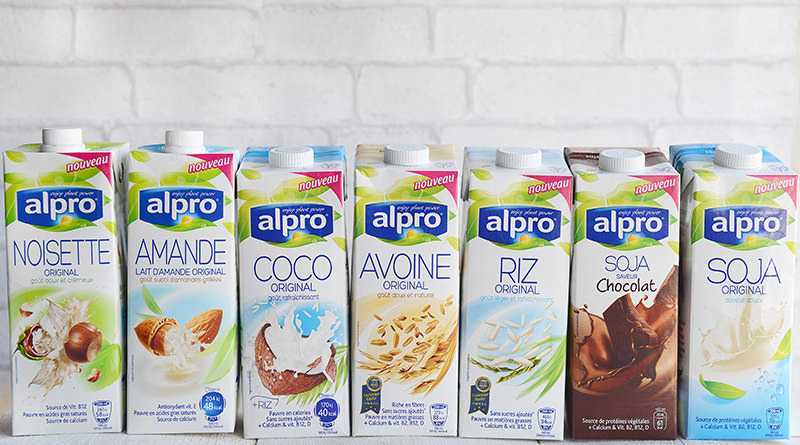 D. — By Lisa C. Baker on January 25, 2016
D. — By Lisa C. Baker on January 25, 2016
Overview
For many families, milk is the drink of choice for toddlers.
But if you have dairy allergies in your family or you’re concerned about health issues like hormones in cow’s milk, then you might question how healthy milk really is. As a result, many parents consider almond milk as a substitute. But is it an effective substitute?
When can babies have milk?
No matter what type of milk you’re switching to, don’t make the change while your baby is still a baby. When your baby is young, they need all the nutrients in breast milk or formula. Regular milk (of any kind) isn’t an appropriate substitute.
Ideally, you should wait until after your baby hits their 1st birthday to introduce milk. That means that really, they’ll be a toddler when they try their first sip of cow or almond milk.
Do toddlers even need milk?
The main nutritional benefits of cow’s milk are protein, calcium, vitamin A, and vitamin D.
In a 2005 study, school-aged kids who drank milk at lunch were the only ones who met the recommended daily allowance of calcium. Toddlers can get their recommended daily allowance from two or three servings of milk per day.
There’s also such a thing as too much milk. When your baby weans from a diet of all breast milk or formula, it’s possible to replace too many of those calories with another kind of milk instead of a variety of solid foods.
Both you and your child are used to milk being the entire meal, but after age 1, milk should be just a supplement, not the main meal.
Too much milk can mean your child is getting too much fat and not enough iron, which can put them at risk of anemia. Your toddler shouldn’t have more than about 16 to 24 ounces (two to three servings) of milk per day.
Finally, if your toddler is still breastfeeding, then another kind of milk isn’t necessary. Breast milk can also supply the protein and calcium your toddler needs as a supplement to a healthy diet of solid food.
How does almond milk compare to cow milk?
Although almond milk has vitamins A and D, it’s relatively low in protein and calcium, as compared to cow milk or breast milk.
The average toddler diet has various sources of protein, but it usually doesn’t include many sources of calcium. That’s why milk is recommended.
Some brands of almond milk are also high in sugar.
However, most commercial almond milk is fortified with calcium to make it equivalent to cow milk in its calcium content. So if your toddler has a dairy allergy or intolerance, fortified almond milk can be an effective substitute.
Almond milk is also lower in calories than cow milk, so it can be a good source of hydration for older toddlers.
How does almond milk compare to breast milk?
Neither almond milk nor cow milk is a good substitute for breast milk. Breast milk contains a wide variety of nutrients that meet all of your baby’s nutritional needs for the first 6 months and the majority of nutritional needs for the first year.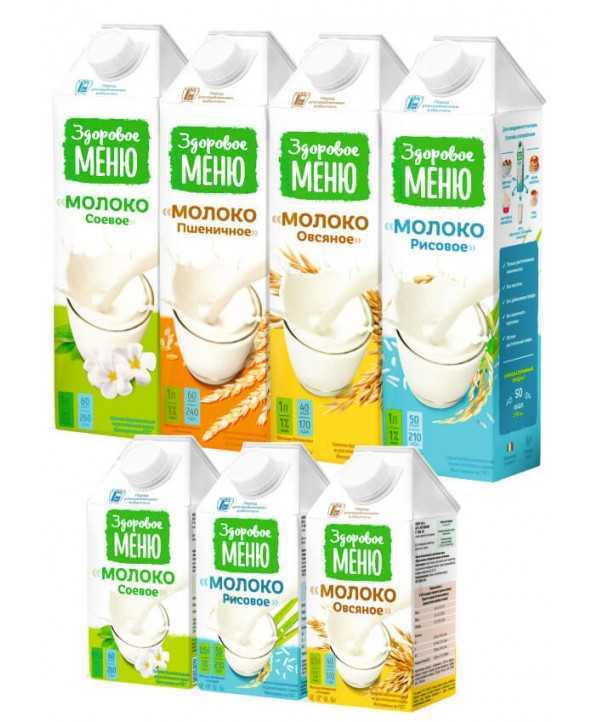
Until your baby is 6 months old, they should drink only breast milk or formula. After 6 months, solid foods can gradually replace breast milk or formula, but your baby shouldn’t have any kind of milk until after their first birthday.
The bottom line
Almond milk is a healthy milk substitute, but it isn’t a good source of calcium unless it’s fortified.
It’s especially important for children and teens to get enough calcium, since bones build up calcium content until around age 30. Insufficient calcium can lead to low bone mass, osteoporosis, and bone fractures later in life.
If you choose almond milk as a substitute for your child, it’s better to opt for a brand that’s fortified with calcium. Avoid brands that are sweetened with sugar or other sweeteners. In addition, make sure your toddler’s diet includes plenty of sources of protein.
Share on Pinterest
Last medically reviewed on January 25, 2016
- Parenthood
- Baby
How we reviewed this article:
Healthline has strict sourcing guidelines and relies on peer-reviewed studies, academic research institutions, and medical associations. We avoid using tertiary references. You can learn more about how we ensure our content is accurate and current by reading our editorial policy.
We avoid using tertiary references. You can learn more about how we ensure our content is accurate and current by reading our editorial policy.
- Allen, R. E. (2006, November 1). Nutrition in toddlers. American Family Physician, 74(9), 1527-1532
aafp.org/afp/2006/1101/p1527.html - At what age babies switch from breast milk or formula to cow’s milk? (2014, February)
kidshealth.org/parent/pregnancy_newborn/feeding/cow_milk.html#cat146 - Calcium. (2012, March 19)
ods.od.nih.gov/factsheets/Calcium-Consumer/ - Feeding Your Baby and Toddler: Birth to Age Two. (2010, September)
med.umich.edu/yourchild/topics/feedbaby.htm - Johnson, R. K., Panely, C., & Wang, M. Q. (1998) The association between noon beverage consumption and the diet quality of school-age children. Journal of Child Nutrition & Management, 22, 95–100.
Our experts continually monitor the health and wellness space, and we update our articles when new information becomes available.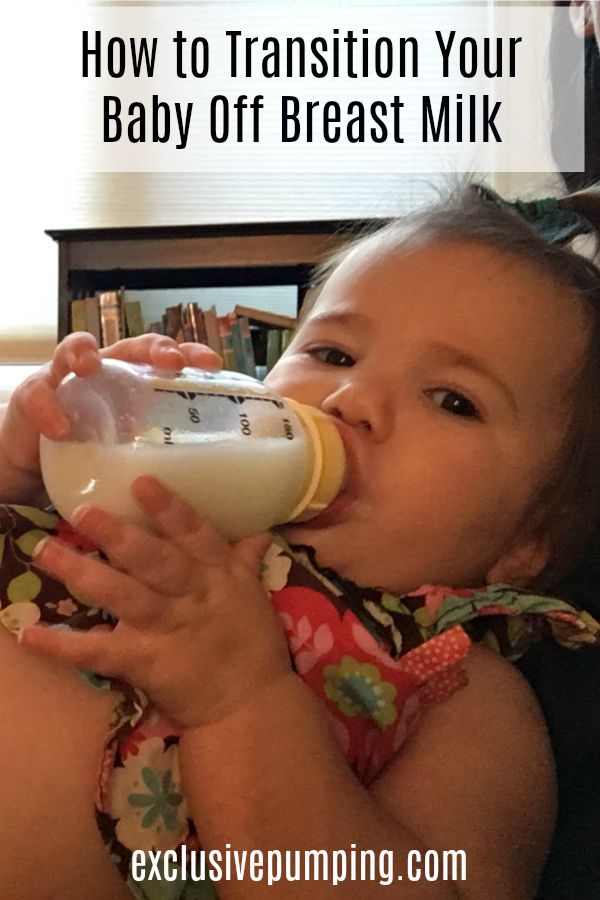
Current Version
Jan 25, 2016
Written By
Lisa C. Baker
Edited By
Frank Crooks
Medically Reviewed By
Karen Richardson Gill, MD
Share this article
Medically reviewed by Karen Gill, M.D. — By Lisa C. Baker on January 25, 2016
related stories
How to Safely Store, Use, and Thaw Frozen Breast Milk
Can Babies Drink Goat’s Milk?
What Does Breast Milk Taste Like? You Asked, We Answered (and More)
8 Nursery Must-Haves You Can Find at Target
What You Should Know About RSV in Babies
Read this next
How to Safely Store, Use, and Thaw Frozen Breast Milk
Medically reviewed by Valinda Riggins Nwadike, MD, MPH
Freezing breast milk can help you safely stockpile milk, either for returning to work or as a backup for when you’re on the go. We explain how to…
READ MORE
Can Babies Drink Goat’s Milk?
Medically reviewed by Jillian Kubala, MS, RD
Goat's milk or goat's milk-based formulas may be a healthy option for babies with cow milk sensitivities or for those with other health concerns about…
READ MORE
What Does Breast Milk Taste Like? You Asked, We Answered (and More)
Medically reviewed by Debra Rose Wilson, Ph.
 D., MSN, R.N., IBCLC, AHN-BC, CHT
D., MSN, R.N., IBCLC, AHN-BC, CHTWe ask adults to describe the taste of breast milk and also look into whether we should be drinking breast milk at all.
READ MORE
8 Nursery Must-Haves You Can Find at Target
Target is a one-stop shop for many household items, including important furniture for your nursery!
READ MORE
What You Should Know About RSV in Babies
Medically reviewed by Mia Armstrong, MD
Respiratory syncytial virus (RSV) can affect people of all ages. But RSV in babies is most serious. Learn about the symptoms and when to get help.
READ MORE
The 23 Best Natural Baby Products
Medically reviewed by Carissa Stephens, R.N., CCRN, CPN
Having a baby can make you aware of the harmful chemicals and toxic ingredients in almost everything.
 Here's our list of the best natural baby…
Here's our list of the best natural baby…READ MORE
19 Kitchen Gadgets to Make Mealtime Easier (and More Fun)
Medically reviewed by Kathy W. Warwick, R.D., CDE
Cooking for the entire family is a big task, but there are a lot of kitchen gadgets out there to make it less hassle and more fun. A few can even get…
READ MORE
The Best Burp Cloths for SOS (Saving Our Shirts)
Medically reviewed by Carissa Stephens, R.N., CCRN, CPN
Spit-up happens... a lot. These are our picks of the best burp cloths to keep your baby dry, your clothes protected, and your life a little less messy.
READ MORE
The Best Baby Booties to Keep Those Tootsies Warm
Medically reviewed by Mia Armstrong, MD
For growing babies, the best baby booties mix style, function, and warmth.
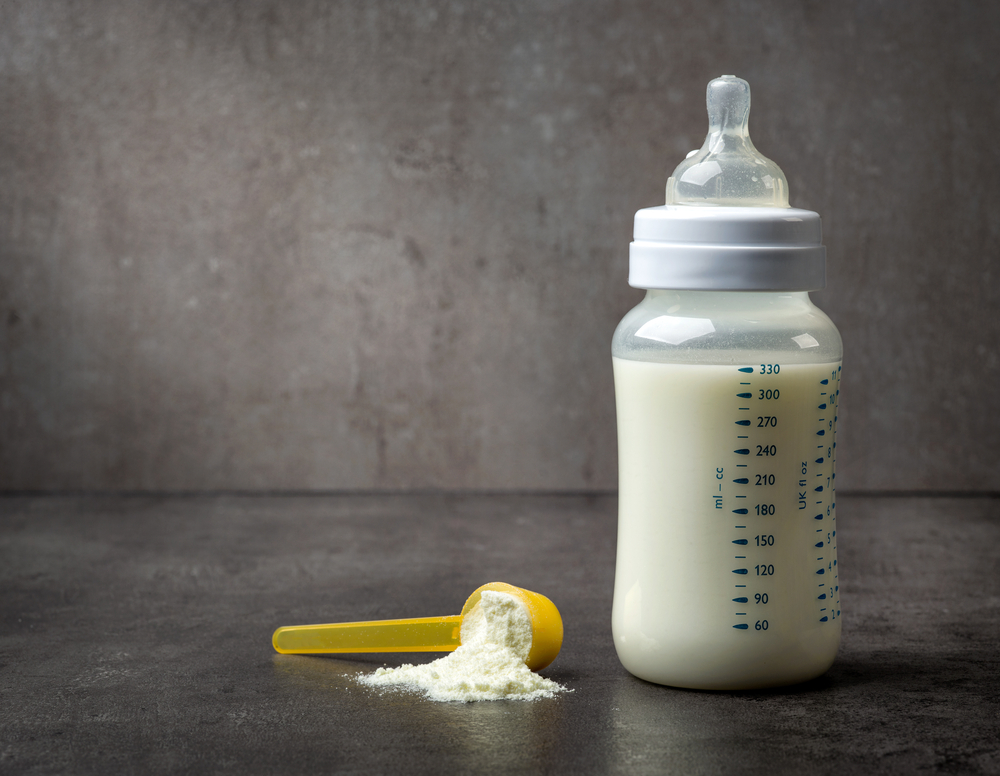 Here are our favorites in 11 categories.
Here are our favorites in 11 categories.READ MORE
10 Mini Crib Mattresses and Top Shopping Tips
Medically reviewed by Carissa Stephens, R.N., CCRN, CPN
The best mini crib mattress is firm enough to fit snugly in a crib and keep your little one comfortable.
READ MORE
Can children drink almond milk?
In this article we will analyze the main questions regarding the inclusion of almond milk in children's diet: from what age is it possible? in what cases is it useful? What's better than good old cow's milk?
Can children drink almond milk?
Almond milk is a drink made from unroasted ground almonds and water. Sometimes the composition may also include additional ingredients: various sweeteners, flavors (vanilla) and nutrients.
Almond milk is popular among those on a dairy-free diet for a variety of reasons. So, many parents choose it for children with lactose intolerance.
So, many parents choose it for children with lactose intolerance.
The frequency of daily consumption of almond milk for babies older than one year is 1-2 times - in the intervals between breastfeeding or taking other products.
Almond milk can only be considered as a supplement to (and not as a substitute for) a baby as it is significantly "poorer" than breast milk or formula in terms of nutrients.
If you decide to give your baby almond milk, make sure that
- it contains a low percentage of sugar;
- it is enriched with calcium and vitamins A and D;
- children consume other forms of fat and protein.
Be sure to ask your pediatrician about additional ingredients in milk, such as flavors or thickeners.
It is also important to find out if the child has a nut allergy. If the baby's relatives have previously had a similar reaction, then you should refrain from introducing almond milk into the diet - until this issue is clarified with the pediatrician.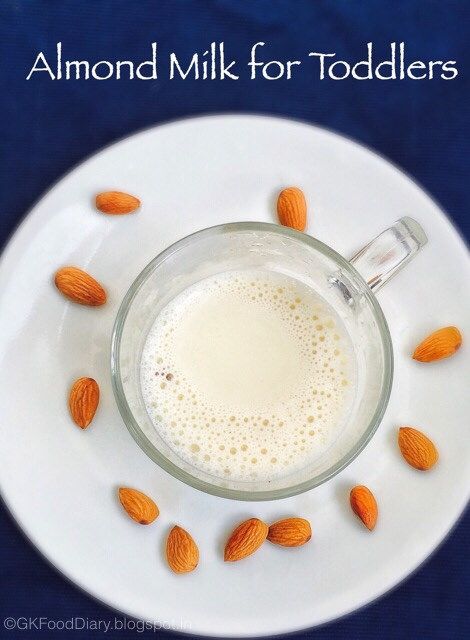
What is the difference between almond milk and cow's milk?
Cow's milk and almond milk have different nutritional profiles. So, for weaning babies aged 1 to 2 years from the breast, some pediatricians recommend whole cow's milk, since it is characterized by a high concentration of fats necessary for the intellectual development of the child. Judge for yourself: one glass of cow's milk contains about 8 grams of fat, while a glass of unsweetened almond milk has only 2.5 grams of fat.
Cow's milk is also high in protein: a glass of whole cow's milk contains nearly 8 grams of protein, while a glass of fortified almond milk has only 1 gram.
Almond milk can only be considered as a complete replacement for whole milk in a child if the child compensates for the required amount of fats and proteins from other foods in the diet.
Cow's milk is also rich in natural sugars, unlike unsweetened almond milk. For children, unsweetened almond milk should be chosen, as sweetened varieties may contain more sugar than cow's milk.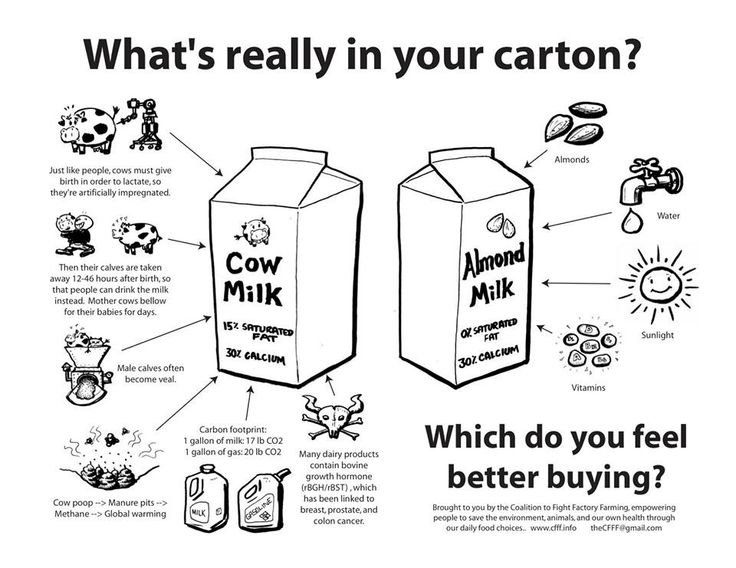
In addition to these differences, these two types of milk are characterized by different vitamin composition.
A glass of cow's milk contains:
- 322 mg of potassium;
- 276 mg calcium;
- 205 mg phosphorus;
- 105 mg sodium;
- 395 IU vitamin A;
- 124 IU vitamin D.
A glass of unsweetened almond milk contains:
- 482 mg calcium;
- 189 mg sodium;
- 176 mg potassium;
- 24 mg phosphorus;
- 499 IU vitamin A;
- 101 IU vitamin D.
Other milks for children
If almond milk is not suitable, you can choose other vegetable milks, for example:
- coconut milk;
- rice milk;
- hemp milk;
- soy milk;
- oat milk.
Before buying plant-based milk, be sure that it is fortified with vitamins and minerals and does not contain a lot of sugar.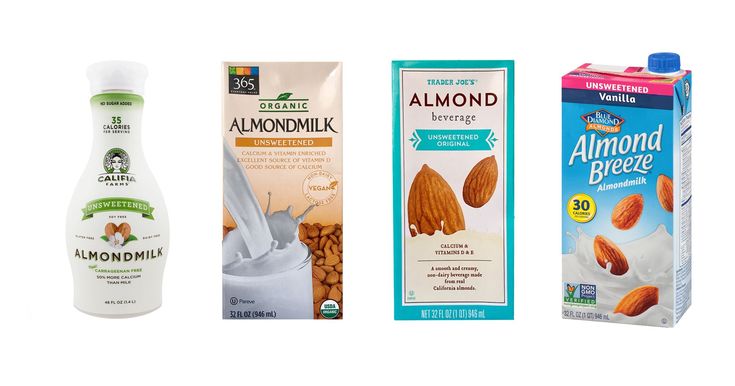
Disadvantages of almond milk for babies
Almond milk fortified with vitamins and minerals can be considered as a supplement to the diet of a baby over 1 year old. However, the following points should be considered:
- additional ingredients such as thickeners and sweeteners are harmful to the baby;
- due to the low content of fat and protein in almond milk, the baby needs to compensate for these substances in other products;
- Children can develop food allergies, so always consult your doctor before adding almond milk to your diet.
It is worth taking into account that after the children are one year old, the maximum daily dose of any milk (except for breast milk) should not exceed 470-700 ml - depending on the individual characteristics of the child.
It is important that after one year of age, babies get most of their vitamins from food and not from fluids.
Total
Adding one or two servings of fortified almond milk per day to a well-balanced baby's diet is a safe alternative to cow's milk. However, pediatricians do not recommend introducing cow's, almond or any other plant-based milk to children under one year old.
However, pediatricians do not recommend introducing cow's, almond or any other plant-based milk to children under one year old.
On the Vikids platform you can:
Subscribe to Vikids news at Facebook!
Registration
Share on your timeline
'+ '
' + '
' + '
Health benefits and harms of almond milk
Almond milk is a plant-based product that has become an excellent alternative to cow's milk. It has a whole set of ingredients useful for the body, saturated with minerals and vitamins. In addition, it is not difficult to cook it yourself. Although in supermarkets it is sold ready-to-eat. But a homemade product, thanks to spices, can acquire a variety of tastes that every consumer will like.
Which milk is healthier: almond or cow's milk
Unlike animal products, almond milk does not contain lactose .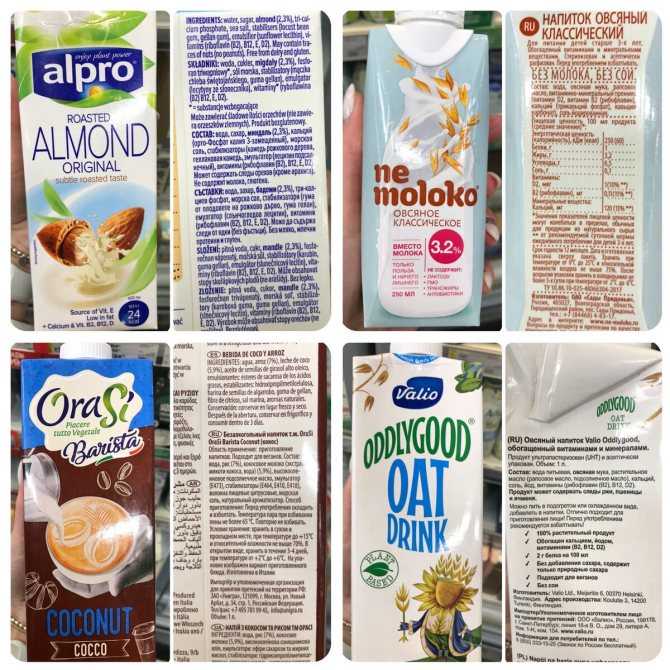 Lactose is a very strong allergen, it causes unwanted reactions in many people. There is no such reaction with almond milk.
Lactose is a very strong allergen, it causes unwanted reactions in many people. There is no such reaction with almond milk.
Cow's milk is a product of animal origin, so its quality depends on the health of the cow itself. May contain pathogenic components: E. coli, salmonella. Cow's milk also contains cholesterol while almond milk does not.
Animal milk contains casein protein, it is easily digested by a child's stomach, but in adulthood, its absorption causes such unpleasant problems as flatulence, heaviness, heartburn. Vegetable milk does not contain this protein, so its use will not cause discomfort from the digestive tract.
Unlike almond milk, almond milk is not good for storage conditions. Without low temperatures in the refrigerator, it stays fresh longer. Thanks to this almond milk taste very similar to animal milk, it can be used in both cooking and cow's milk.
Composition and calories
Almond drink is based on only two main ingredients: water and almonds.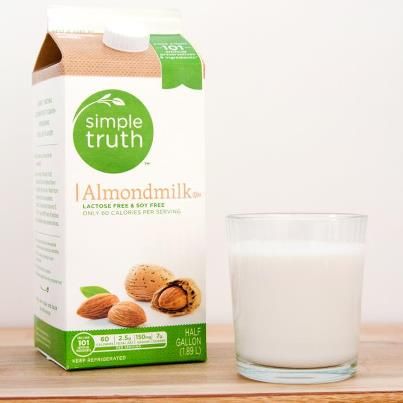 For the preparation of milk, raw almonds are used, without heat treatment, so that they retain all the useful substances. The composition of the drink is based on 100 g. Energy value :
For the preparation of milk, raw almonds are used, without heat treatment, so that they retain all the useful substances. The composition of the drink is based on 100 g. Energy value :
- Proteins - 18.6 g.
- Fat - 53.7 g
- Carbs - 13g
- Cell tissue - 2.5 g
- Calories 51.
Vitamins:
- A - 0.02 mg.
- B1 - 0.25 mg.
- B2 - 0.65 mg.
- B3 - 6.2 mg.
- B4 - 52.1 mg.
- B5 - 0.4 mg.
- B6 - 0.3 mg.
- B9 - 0.04 mg.
- C - 1.5 mg.
- D - 100 mg.
- E - 24.6 mg.
Micronutrients:
- Potassium - 748 mg.
- Phosphorus - 473 mg.
- Calcium - 273 mg.
- Magnesium - 234 mg.
- Sulfur - 178 mg.
- Sodium - 10 mg.
Macronutrients:
- Iron 3.7 mg.
- Iodine - 2 mcg.
- Manganese - 1.9 mg.
- Copper - 140 mcg.

- Fluorine - 90 mcg.
- Zinc - 2.1 mcg.
Almond milk has the richest composition of all herbal drinks. A glass of this product is able to provide energy for a long time and supply the body with vitamins.
What's good about almond milk?
Total benefit
Almond milk has been known all over the world since the Middle Ages . It is used throughout Europe due to its longer shelf life. At a time when refrigeration, pasteurization and sterilization were not yet known to the world, cow's milk was either eaten immediately or processed into cheese and butter. However, almond milk was stored for a long time, and this plant-based product could be consumed during fasting.
The plant's products have already gained a very strong market position. Every day, the number of supporters of a healthy diet, vegans and vegetarians is growing in the world. However, 15 years ago, soy milk was almost the only alternative to animal milk.
Almond drink was introduced to the US market by Blue Diamond in 2008. First, large contracts were awarded to shops in areas where Hispanics live, because they are usually lactose intolerant. In parallel with the release of milk, almond producers are actively beginning to sponsor research on the health benefits of this product.
They have proven the benefits of the product. Thanks to its calcium content, milk strengthens bones, vitamins and macronutrients regulate muscle strength, and protein helps the body recover faster. strength. Vitamin D, which is enriched with almond milk during the production process, in combination with phosphorus regulates blood pressure, and the lack of cholesterol in the drink makes it a good product for the heart.
Limited amounts of phosphorus and potassium in milk will benefit people with kidney disease , and the lack of sugar and rich vitamins will strengthen the immune system. It is worth considering the benefits of this product for people of different sex and age.
For women
Most women are still worried about the problem of extra pounds. Almond milk is a dietary product. Its calorie content is very low, the lack of sugar in the prepared drink will help to reduce weight and will not gain it again in the future. This, of course, does not mean that using only almond milk, you can achieve excellent weight gain.
For the rest of the diet, you will need to set some limits and exercise. But almond milk will enrich the body with energy, provide it with a complete set of vitamins and minerals, an ideal balance of saturated and unsaturated omega-3, omega-6 and omega-9 fatty acids, without loading it with additional calories and cholesterol.
In addition, a rare woman does not care about the beauty of her nails, hair and skin. Almond milk is rich in vitamin E , combined with the same fatty acids, gives the skin a healthy glow. Hair and nails will be strong and healthy if you drink them regularly. Almond milk also strengthens bones and teeth.
For men
In addition to the fact that the amino acids contained in almonds help maintain good physical condition, make muscles and tissues more elastic, for men, the almond product is simply magical due to several other properties. As part of the almond seed, it is an ingredient such as arginine. This amino acid is produced by the body itself as an adult, but sometimes in insufficient quantities. Its purpose is the synthesis of nitric oxide enzymes. And nitric oxide, in turn, is a local hormone. It acts on the blood vessels, including the organs of the male genital organs, and is responsible for their filling with blood and growth, i.e. for an erection.
Zinc and selenium, which provide testosterone synthesis, are also essential for male libido. This allows the male body to produce high quality sperm and reduces the risk of prostatitis, while the beneficial macronutrients contained in almonds help in the production of this hormone.
Also contained in almonds, vitamin E or tocopherol has a direct effect on the male body during sexual intercourse, preventing oxygen from oxidizing until it reaches the sex cells.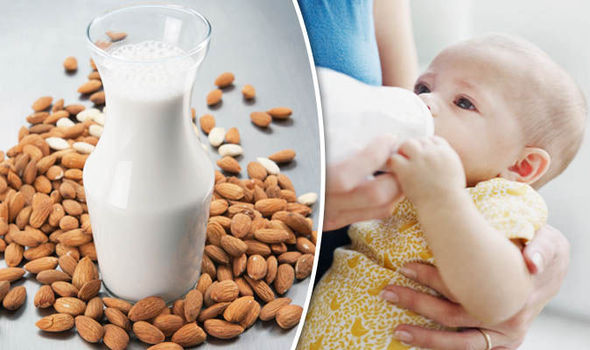 That is why almonds have long been considered an aphrodisiac. In addition, almonds help increase mental alertness, improve hair growth and quality, thereby preventing baldness, and also help eliminate hangover symptoms.
That is why almonds have long been considered an aphrodisiac. In addition, almonds help increase mental alertness, improve hair growth and quality, thereby preventing baldness, and also help eliminate hangover symptoms.
During pregnancy
Almond and almond drink contain folic acid . Vitamin B9 (folic acid) has a direct effect on the nervous, circulatory and immune systems of the fetus. Its use is shown to all women in this position, both in combination with other vitamins, and as an independent element. B9 reduces the risk of congenital pathologies in a child, due to which it is visible to the expectant mother and future father, even when planning a pregnancy.
Almond milk is good because it contains a natural vitamin. In addition, a wide range of B vitamins will help pregnant women cope with stress, and E will protect the body from stretch marks.
When breastfeeding
Avoid almond milk when breastfeeding. Breast age is an indicator that almond milk is not only useless, but also harmful.
In Spain, doctors examined a child who had been given a formula based on an almond drink since the second month of life. Unfortunately, no positive reactions were found in this case. In contrast, low levels of vitamin C in almond milk resulted in scurvy at 11 months of age. In addition, the child lost the ability to move independently, and doctors again stated that this condition was caused by low vitamin C, as it interferes with collagen synthesis. After enrichment therapy in a small patient with vitamins C and D, his condition improved significantly. However, the doctors came to the clear conclusion that with NV and as a substitute for breast milk for children, this drink is not suitable.
For children
Although almond milk is not good for children, drinking almonds is very beneficial for older children . Thanks to its high content of calcium and vitamin D, milk will keep your hair, bones and teeth healthy. However, they should not completely replace cows unless the child is intolerant.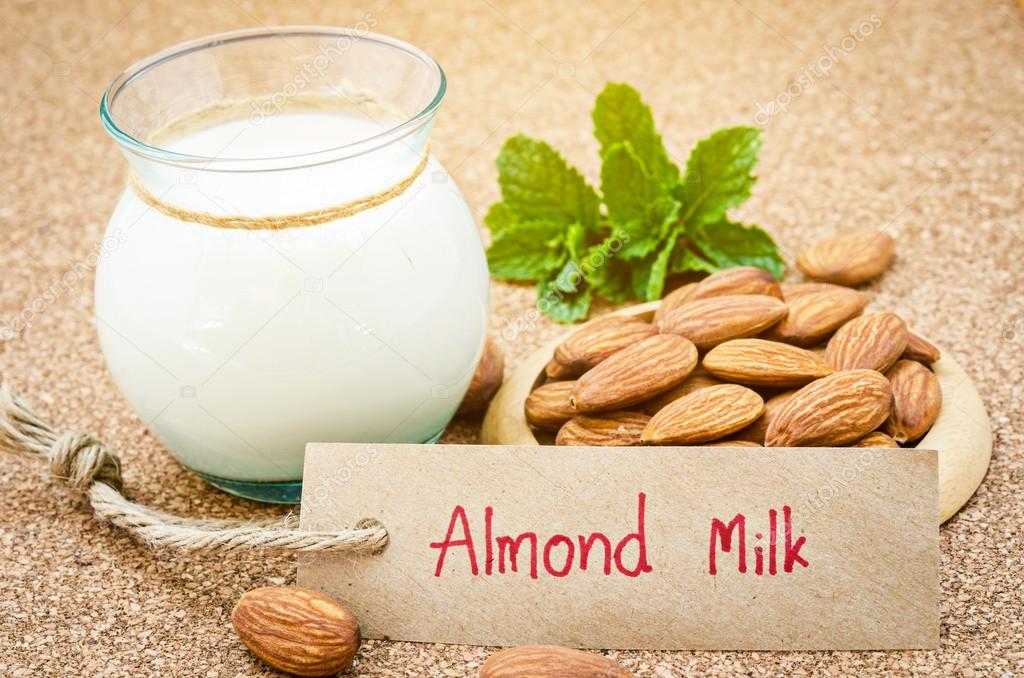
Almond milk, with all its wide range of positive qualities, has one very important negative quality, especially for children. The protein content in cow's milk is 16 g per 100 g of product. Almond milk contains only 4 g. Canadian scientists have concluded that this is an indicator that affects the growth of the child, so children who consume only plant-based milk have short stature compared to their peers who consume animal products.
When a child loses weight
Special attention should be paid to almond milk as a product in various diets . With a low calorie content, it is nutritious and rich in vitamins. Its beneficial effect on the body will avoid the discomfort caused by food restrictions. Almond drink cleanses the body of cholesterol. Almond milk can replace a fat cow.
If you need to shed a few pounds in an emergency, you can spend one day on an almond drink with green tea. Such a diet will help not only immediately remove excess weight from the body, but also neutralize it.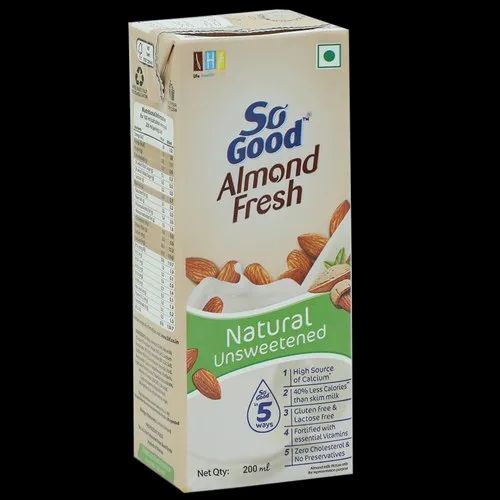
To make this drink in 1.5 liters of freshly brewed and slightly chilled almond milk, add two tablespoons of loose green tea, leave for 20 minutes, strain and drink throughout the day.
Such unloading days often cannot be organized, just twice a month. It is important to drink plenty of purified non-carbonated water along with the drink, as it has a strong diuretic effect and it is necessary to maintain the water balance in the body.
In other diets where plant-based milk replaces cows, it is beneficial due to its low glycemic index (glycemic index - 15 units), as well as antioxidant properties. The finished product is better to use with your own hands. In such a drink there will be no artificial ingredients, sweeteners and other unnecessary substances.
Almond milk in medicine
Since ancient times, almonds have been used for medicinal purposes. Arab healers used it for intestinal diseases and painful urination, pathologies of the upper respiratory tract and asthma. As mentioned above, almonds have a beneficial effect on the quantity and quality of male seeds. Nuts are used for peptic ulcer and hyperacidity, kidney diseases.
As mentioned above, almonds have a beneficial effect on the quantity and quality of male seeds. Nuts are used for peptic ulcer and hyperacidity, kidney diseases.
To make milk you will need ½ cup of nuts soaked for 12 hours, peel the skin after soaking and stop the immersion mixer with a few tablespoons of warm boiled water. Then dilute the resulting porridge with 400 ml of water and beat well again. After reaching room temperature, place the resulting drink in the refrigerator. It can be drunk, and also used as a compress for breast tumors.
Medicinal "golden drink" is prepared on the basis of almond milk , indicated for inflammatory processes, for the treatment of diseases of the muscles and joints. To make this drink, mix 3 cups of fresh almond milk with 3 teaspoons of turmeric, 1 teaspoon of cinnamon and 1 teaspoon of honey, blend all ingredients well using a blender. At the first signs of inflammatory diseases, you should consume 1 cup of this cocktail per day.
The use of such a drink without symptoms will have a preventive effect on the body and protect it, strengthen the immune system.
Use in cosmetology
No less popular than in medicine are almond milk and cosmetology. Its beneficial substances perfectly cleanse pores, give elasticity and firmness, fight dryness and lethargy, prevent wrinkles, soften, nourish and moisturize the skin, and even protect from the sun. Due to these properties, almond milk is widely used in the preparation of various creams, massage oils, soaps, aftershave and sun protection products.
Considering that almonds are not exotic and quite affordable, You can prepare various cosmetics yourself . To prepare a skin care tonic, immerse sweet almonds in boiling water, peel the husks, grind in a mortar or grinder, and pour warm water over them to coat the nut powder. Cover and leave for 3-4 hours. Then unload and leave for another 1.5-2 hours. During this time, the mixture will separate.